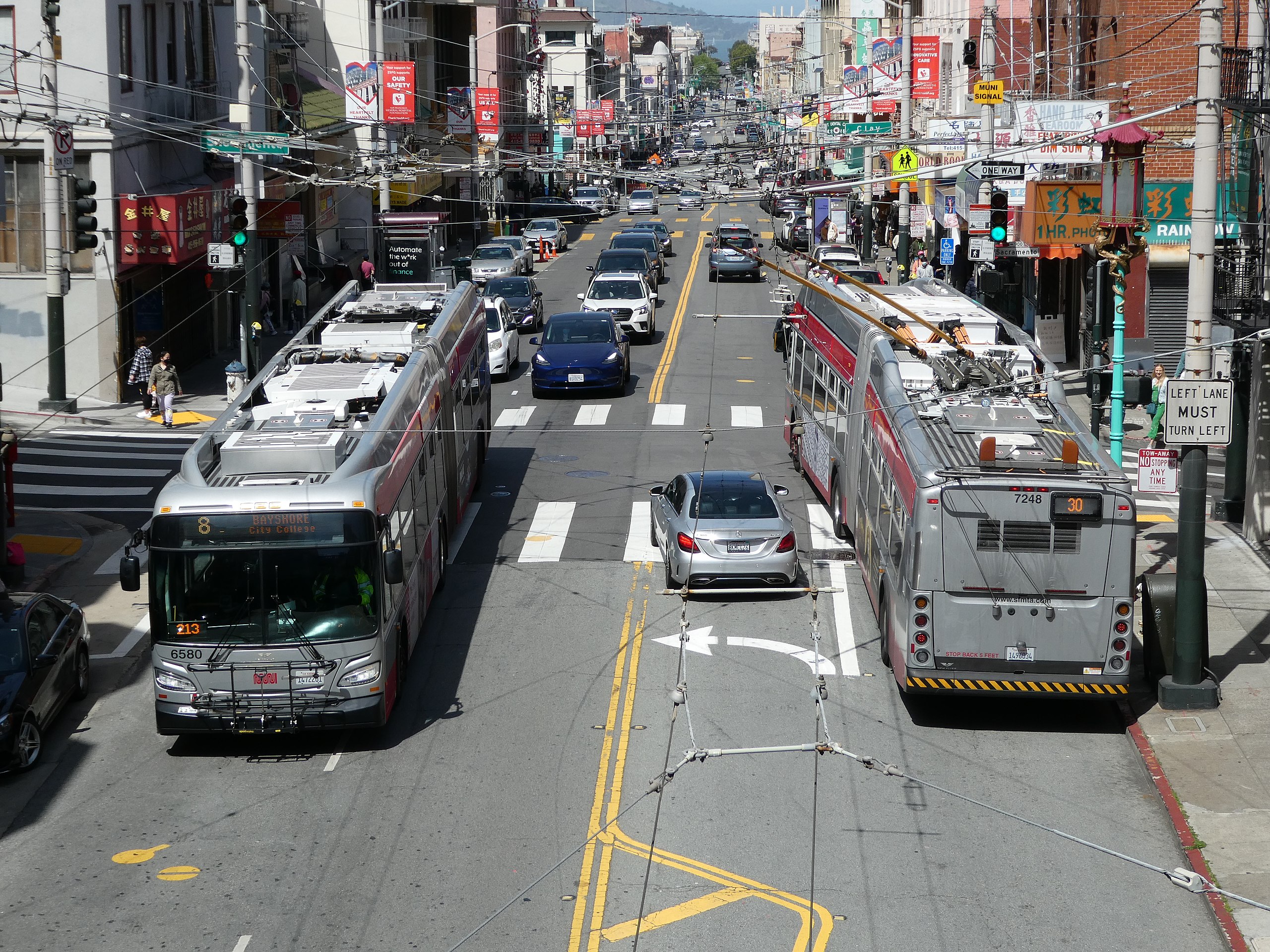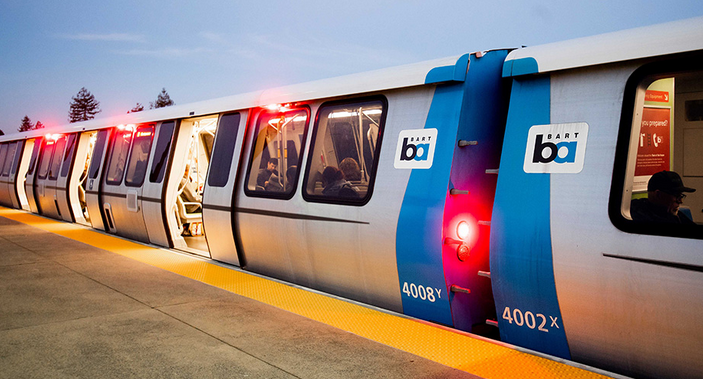Donald Trump is once again our president-elect, Muni funding failed at the ballot, and Daniel Lurie will be our new mayor. What does this all mean for public transit in San Francisco as Muni and BART face major budget deficits in the next few years?
Federal
History shows that we can expect the Trump White House to be actively hostile to public transit. In his previous term, Donald Trump proposed multiple cuts to public transportation in the federal budget, including cuts to city transit projects and Amtrak, and he shifted federal grants to highly prioritize road projects over public transit projects.
GOP control of Congress also means that any new transportation funding for San Francisco will be an uphill battle, especially for the day-to-day operational funding that our local and regional agencies need. Historically, the federal government has only provided significant transportation funding for “capital” projects that fund things like infrastructure and equipment, rather than the operational costs that agencies need to pay to run continuous service. The federal government stepped in to provide some operational funding during the pandemic, but that money is running out, leading to the major deficits our transit agencies are now facing.
Two pieces of legislation were introduced this year to create federal programs to provide operational funding to transportation agencies, but without support from congressional Republicans, neither were ultimately passed. With the upcoming Republican control of both bodies of Congress, it is unlikely that any new operational funding will come from Congress in the next few years.
The incoming Trump administration highlights the need for transit organizers here in San Francisco to come together to prepare for potential cuts and rally around new sources of local and state funding for transit.
Local
Proposition L, the grassroots measure to fund Muni by taxing ride-hail corporations like Uber and Waymo — won majority support with 56.9% of the vote, but failed to gain more “yes” votes than Proposition M, a tax-reform measure that contained a “conflict clause” which cancelled out Prop L. Because of Proposition M, the 210,375 votes in favor of Muni funding were overruled.
The seeds of what eventually grew into Prop L were planted years ago when San Francisco Transit Riders convened the Transit Justice Coalition, a group of local organizations dedicated to creating and funding a sustainable and equitable public transit system in the city. The coalition created a report that outlines what an equitable transit system should look like for San Francisco and suggests a ride-hail tax as a potential funding source for those changes.
After the Transit Justice Coalition published its report and shared its findings, a group of independent transit activists used the coalition’s insights to help craft Prop L. In less than a year, the Prop L campaign mobilized hundreds of volunteers to mount the first truly grassroots campaign in San Francisco in years — self-funded and almost entirely volunteer-run. When Prop L officially made it on the ballot earlier this year after collecting thousands of petition signatures from voters, San Francisco Transit Riders was proud to endorse it.
Naturally, the outcome of the campaign was rough for us and the hundreds of volunteers who poured their hearts, time, and money into this campaign. Harder still will be the service cuts we expect to face as soon as next year if additional funding isn’t identified — the first cuts have already been announced. (Future SFTR blog posts will cover the Muni “doomsday” service cuts scenario that the agency recently unveiled at the city’s Muni Funding Working Group, which shows what Muni service will look like if the full fiscal cliff is left unaddressed.)
We are yet to understand exactly how Mayor-elect Daniel Lurie will choose to respond to the Muni budget deficit. In our Ride the Vote election questionnaire, he said that he will “advocate strongly for state and federal funding,” and that he supports “modernizing the fleet, investing in operational efficiencies, and securing sustainable funding mechanisms.”
If sufficient funding isn’t identified, he supports “making strategic, data-driven cuts that prioritize preserving essential services for low-income and transit-dependent communities. Cuts should focus on underutilized routes and administrative efficiencies rather than essential services.”
San Francisco Transit Riders is looking forward to working with the Lurie administration to help the Mayor understand the needs of transit riders and the importance of a full and thriving Muni system in achieving his vision for San Francisco.
How must we respond?
San Francisco Transit Riders’ member working groups will continue to meet regularly to hear updates, meet with officials, and chart a path forward that sees Muni fully funded. If you haven’t yet, consider becoming a member and joining a working group to continue the grassroots movement to fund San Francisco transit.
One path to funding is through a regional transit funding measure, which is crucial to help agencies region-wide maintain their service. The regional entity behind the measure, the Metropolitan Transportation Commission, still has not reached a consensus on what that measure should look like, and whether it should generate enough revenue to fully fund every agency’s full deficit (we think it should). San Francisco Transit Riders is a proud member of the Voices for Public Transportation coalition, where we will be working with our partners to connect our members with legislators and demand that the final version of the regional measure addresses transit riders’ needs.
Another crucial line of advocacy is around local funding. As a member of the city’s Muni Funding Working Group, San Francisco Transit Riders is receiving the most up-to-date information about the deficit from the city, and weighing in on proposed local responses. The city must not balance this deficit on the backs of transit riders, and we will continue to fight against service cuts and fare increases that will burden the hundreds of thousands of people who rely on Muni every day. Instead, the city should look to other funding sources like changes to parking fees and metering, and if necessary, transfers from the city’s general fund. If you’re interested in helping fight for these changes (or have any creative ideas of your own), please become a member and join us in our regular Transit Funding Working Group meetings.
Finally, we also need more help from the state. California can shift highway funding towards public transit and make it easier for local agencies to get operating support through existing programs. California continues to invest an unacceptable amount of public funds towards projects that increase greenhouse gas emissions and cater to drivers. Even if we can solve our funding situation locally, we still need to change transportation funding at the state level if we don’t want to end up back in this situation the next time we face an unforeseen funding crisis like the COVID pandemic.
One thing is clear: We can’t do any of this without you.
San Francisco Transit Riders is proud to support transit riders like you with our education and advocacy, but we really need your help to change the lopsided transportation funding landscape for good. We will need to stick together as transit riders over the next few years to make sure our voices are heard from City Hall to Sacramento to Washington. From standing up to budget cuts, restoring our lines, and blocking fare increases, I’ve seen transit riders in San Francisco do amazing things. I know that if we come together now we can get the funding we need to not only overcome the current challenges but also create the world-class transportation system that San Francisco deserves.
***
Dylan Fabris is Community & Policy Manager for the San Francisco Transit Riders. This post originally appeared on the San Francisco Transit Rider's Medium page and is reprinted here with permission.






